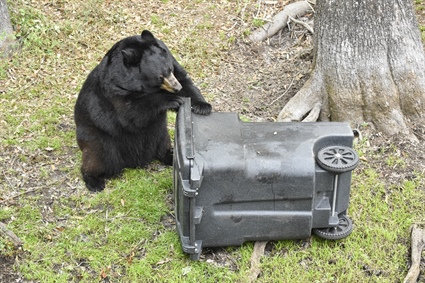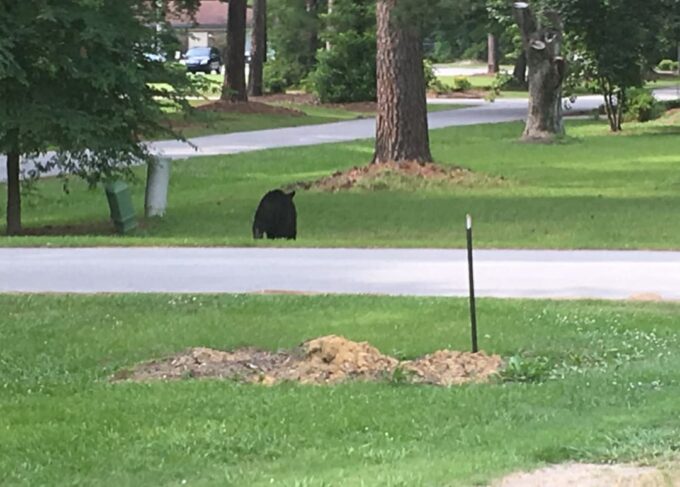It’s bear season again – but not for hunters.
Black bears are on the move across North Carolina. In Columbus, which has always been a haven for black bears, a few have made brief forays through neighborhoods across the county.
Late spring into mid summer is a peak time for bear activity, as yearling males are pushed out of the family by mother bears before breeding season. Colleen Olfenbuttel, the bear biologist with the Wildlife Resources Commission, said bears don’t want to be around people any longer than necessary.
“Most bears that wander into a residential area will quickly retreat to their natural habitat, particularly if no food source is around,” Olfenbuttel said.
As the state’s population of bears has grown through conservation efforts, the state’s human population has grown as well, bring more people into what was once prime habitat for bears.
“While these young bears, typically males, may appear to be wandering aimlessly around, they are not necessarily lost,” Olfenbuttel said. “Most are simply exploring their new surroundings and will move on, particularly if they are left alone and there is no food around.”
Food is the primary motivator for the big furry animals, Olfenbuttel said. The state’s BearWise program offers some basic advice on preventing or at least reducing bear visits:
- Never feed or approach a bear. Intentionally feeding bears or allowing them to find anything that smells or tastes like food teaches bears to approach homes and people to look for more. Bears will defend themselves if a person gets too close, so don’t risk your safety and theirs.
- Secure food, garbage and recycling. Food and food odors attract bears, so don’t reward them with easily available food or garbage. Store bags of trash inside cans in a garage, shed or other secure area; or use garbage cans or trash containers with a secure latching system or that are bear resistant. Place trash outside as late as possible on the morning of trash pick-up — not the night before.
- Remove bird feeders when bears are active. Birdseed, other grains and hummingbird feeders have high calorie content making them very attractive to bears. Removing feeders is the best way to avoid creating conflicts with bears.
- Never leave pet food outdoors. Feed pets indoors when possible. If you must feed pets outside, feed in single portions and remove food and bowls after feeding. Store pet food where bears can’t see or smell it.
- Clean and store grills. Clean grills after each use and make sure that all grease, fat and food particles are removed, including drip trays. Store clean grills and smokers in a secure area, like a garage or shed.
- Alert neighbors to bear activity. If you see bears in the area or evidence of bear activity, tell your neighbors and share information about how to avoid bear conflicts.
Three major attractors for bears are bird feeders, grills and garbage cans. All three can be somewhat “bear-proofed”, the biologist said.
“Attract birds and other pollinators rather than bears by removing bird feeders and using native plants, natural foods, shelter, water and safe nesting sites,” Olfenbuttel said. “Consider using a bear-resistant trash container, altering your current container to become bear-resistant, or securing your current trash container in a building and putting it out the morning of pick-up.

The WRC advises that the best option is a hands-off approach, allowing the bear to leave on its own.
The Wildlife Commission does not trap and relocate bears. There are no remote places to move bears, and relocation can be treacherous for the bear, as they are unfamiliar with the new place and the food resources, causing them to attempt the journey back to where they were captured, which they consider home. During that journey, they can encounter lots of dangers, including crossing busy roads, often resulting in vehicle-bear collisions.
However, relocation is not needed, as human activities and behavior are usually the cause of the problem and the best solution is to implement the BearWise Basics, Olfenbuttel said.
For more information about living responsibly with black bears visit BearWise.org. For questions regarding bears and other human-wildlife interactions, contact the Commission’s NC Wildlife Helpline, Monday through Friday, 8 a.m. – 5 p.m., at 866-318-2401 or email HWI@ncwildlife.org.
“Bears have adapted to living near people,” Olfenbuttel said. “Now it’s up to us to adapt to living near bears.







